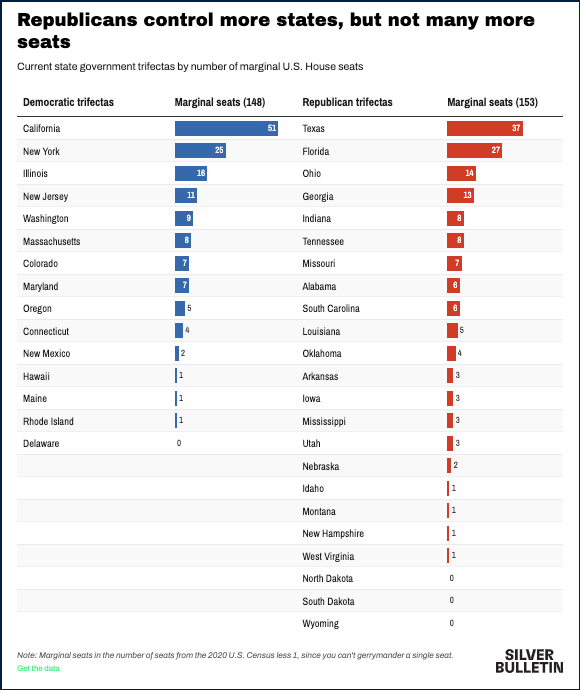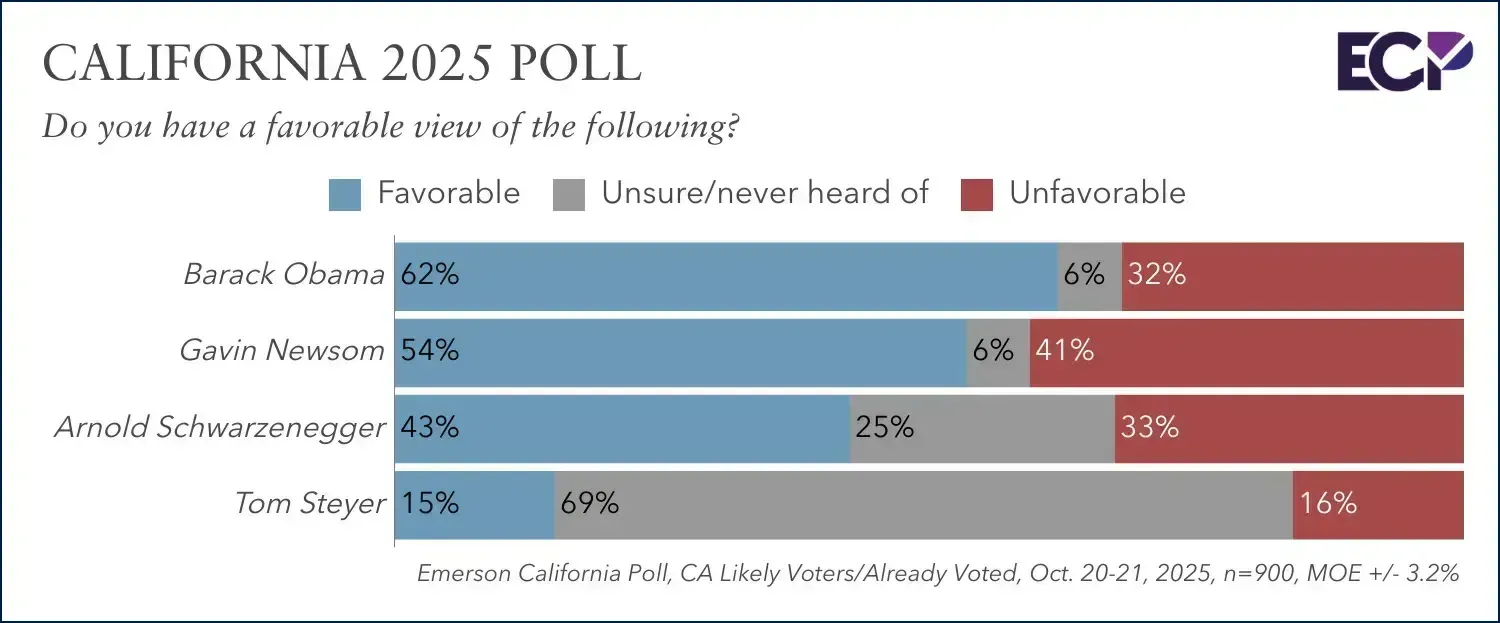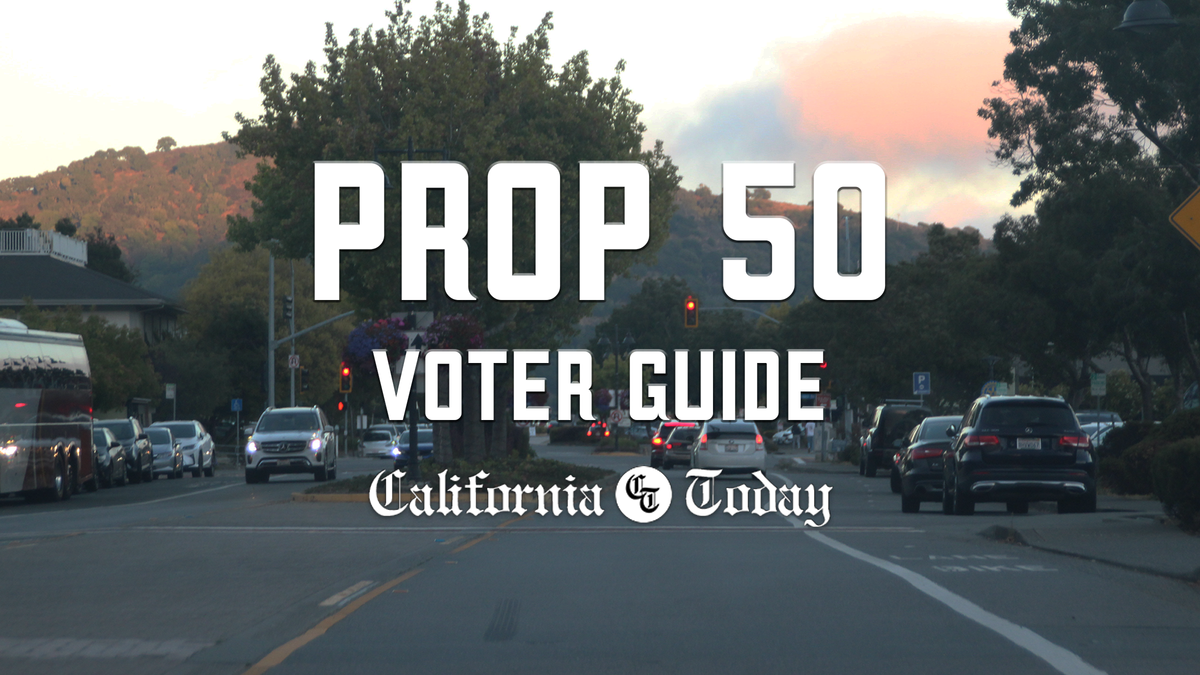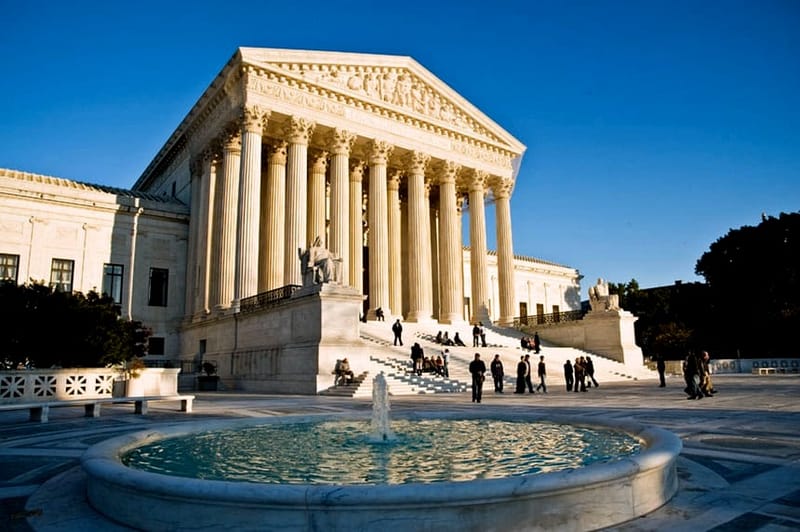Proposition 50 poised for passage as support rises statewide
A new Emerson College Polling survey finds 57% of California voters support Proposition 50, Gov. Gavin Newsom’s plan to temporarily alter congressional redistricting. The measure appears likely to pass ahead of November’s special election.
California’s Proposition 50 appears headed for approval, according to a new Emerson College Polling survey showing growing public support for the measure. The poll finds that 57% of likely voters now say they intend to vote “Yes,” while 37% plan to vote “No.” The proposal—Governor Gavin Newsom’s plan to temporarily return congressional redistricting authority to the state Legislature—has gained traction heading into next month’s special election.
The new poll, conducted October 20–21, 2025, shows Proposition 50 holding a statistically significant lead well beyond the survey’s margin of error, according to Spencer Kimball, executive director of Emerson College Polling. In practical terms, that means the results are unlikely to be the product of sampling variation alone — indicating a genuine shift in voter sentiment.
The data suggest growing agreement that the proposal is a needed countermeasure to recent Republican redistricting maneuvers in states like Texas and Missouri. With just over a week remaining before ballots are cast, the numbers underscore a pivotal moment in California’s ongoing struggle over who shapes its congressional districts — and, by extension, the balance of power in the U.S. House for 2026.
Demographic Shifts Fueling the Surge
Emerson’s October survey shows a sharp swing in support among key demographic groups, led by a surge in approval from Black voters.
“Certain demographic groups that were hesitant to support the measure last month have come around to support Prop. 50, such as Black voters, whose support increased from 45% to 71%.”
-Spencer Kimball, Executive Director of Emerson College Polling.
Support among independent voters also ticked up, reflecting a broader perception that the initiative is a practical — if politically charged — move to ensure California’s influence in Washington remains intact. Latino and Democratic voters have maintained steady support, while Republican opposition has held firm.
Regionally, Southern California and the Bay Area remain the most favorable toward the measure, with particularly strong enthusiasm in Los Angeles County and the Bay Area’s urban districts. Together, these shifts underscore a late-cycle surge that has transformed Proposition 50 from a contested proposal into one that appears poised to win comfortably at the ballot box.
Voter Sentiment: “Good Idea” vs. “Bad Idea”
The Emerson College Polling results also reveal how voters are framing Proposition 50 in broader moral and strategic terms. A majority of 56% now say the measure is a “good idea,” up four points from 52% in September. Only 44% view it as a “bad idea,” marking a notable decline in opposition sentiment as the election nears.
Among those planning to vote Yes, 89% say Proposition 50 represents a good idea, while just 11% disagree. The inverse is true among No voters — 93% see the measure as a bad idea and only 7% consider it worthwhile. This divide highlights the intensity of conviction on both sides and how the initiative has evolved into a proxy battle for national partisan control over redistricting. To many California voters, Proposition 50 is less about technical mapping procedures and more about political leverage — a fight over whether Democrats should match the aggressive redistricting tactics already embraced by Republicans in other states.
The Broader Political Context
At its core, Proposition 50 represents Gov. Gavin Newsom’s response to Republican-led redistricting campaigns in states like Missouri and Texas, where mid-decade map redraws have strengthened GOP control ahead of the 2026 midterms. The measure would temporarily suspend California’s independent redistricting commission and allow the Legislature — dominated by Democrats — to redraw congressional boundaries through 2030.
In an August analysis, political statistician Nate Silver described the initiative as evidence that Democrats are finally “learning to play the redistricting game” after years of taking what he called a “when they go low, we go high” approach. Silver noted that while Proposition 50 signals a “race to the bottom” in partisan mapmaking, it is also a “necessary evolution” under current Supreme Court rules, which leave gerrymandering outside federal judicial oversight following the Rucho v. Common Cause decision.

Key Political Figures and Favorability Ratings
The Emerson College Polling results also measured favorability toward several key figures involved in the Proposition 50 debate. Former President Barack Obama, a leading proponent of the measure, remains deeply popular among California voters, with a 62% favorable and 32% unfavorable rating. On the other side, former Governor Arnold Schwarzenegger, who has opposed Proposition 50 and defended the state’s independent redistricting commission, registers a 43% favorable and 33% unfavorable rating.

Governor Gavin Newsom, who placed the initiative on the ballot, maintains a 48% job approval rating compared to 41% disapproval, suggesting stable support despite the political risk associated with the proposal. Meanwhile, former President Donald Trump — whose redistricting push in GOP-led states helped spark California’s response — holds just 37% approval and 60% disapproval among likely voters statewide.
Obama’s enduring popularity in California appears to have bolstered the case for Proposition 50, particularly among Democratic and independent voters who trust his endorsement as a signal that the measure is both strategic and justified. His backing contrasts sharply with Schwarzenegger’s opposition, symbolizing the ideological divide over whether California should continue to play defense on redistricting or move to reclaim control.
Voter Priorities and 2026 Outlook
While Proposition 50 dominates the headlines, the Emerson poll highlights a broader political landscape that will shape California’s 2026 elections. The economy (30%) and housing affordability (26%) remain the top concerns for voters, followed by threats to democracy (12%) and immigration (11%). This hierarchy of issues suggests that even as redistricting energizes partisan debate, most Californians remain focused on daily economic pressures and the cost of living.

Looking ahead, the survey shows no clear frontrunner for the 2026 gubernatorial race. Republican Steve Hilton leads the early field with 16% support, narrowly ahead of Democrat Katie Porter (15%) and Republican Chad Bianco (11%), while Xavier Becerra and Antonio Villaraigosa each draw 5%. A significant 39% of voters remain undecided, signaling that the state’s political direction post-Prop 50 could hinge on how the measure’s passage — or failure — reshapes California’s congressional map and party momentum heading into the next cycle.
Methodology and Data Transparency
The Emerson College Polling survey was conducted October 20–21, 2025, sampling 900 likely California voters with a credibility interval of ±3.19 percentage points. Data were weighted by gender, education, race, age, party affiliation, and region in line with U.S. Census parameters and voter file data. The survey was administered via MMS-to-web texts and online panels, offered in English, and funded by Emerson College.
Respondents were matched to the Aristotle voter file using full name and ZIP code to ensure data accuracy. As Emerson notes, subsets based on demographics such as race or education carry higher credibility intervals due to smaller sample sizes. Full question wording, cross-tabulations, and demographic details are available in the topline results provided by Emerson College Polling.
For transparency, California Today has reviewed the raw topline dataset — which confirms the headline findings: 57% support for Proposition 50, 37% opposition, and 60% overall approval including undecided voters.
“All Signs Point to Passage”
With just days remaining before Californians cast their ballots, the latest polling suggests Proposition 50 is heading toward approval. Support has solidified across key demographics, particularly among Black and independent voters, while momentum continues to build among Democrats and moderates who see the initiative as a safeguard against Republican-led redistricting elsewhere in the country.
If the results hold, Proposition 50 will mark a turning point in how California — and perhaps the nation — approaches partisan mapping. It would hand Governor Gavin Newsom and the state Legislature new authority to redraw congressional districts through 2030, reshaping political boundaries and potentially the balance of power in the U.S. House.
As Election Day nears, all signs point to passage, setting the stage for one of the most consequential redistricting shifts in modern California history.
Learn More:









